
Question Number 209023 by Spillover last updated on 30/Jun/24
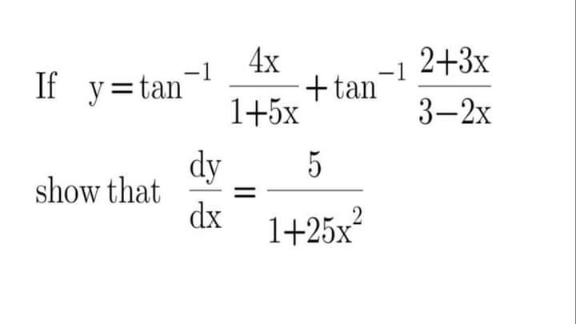
Commented by Spillover last updated on 01/Jul/24
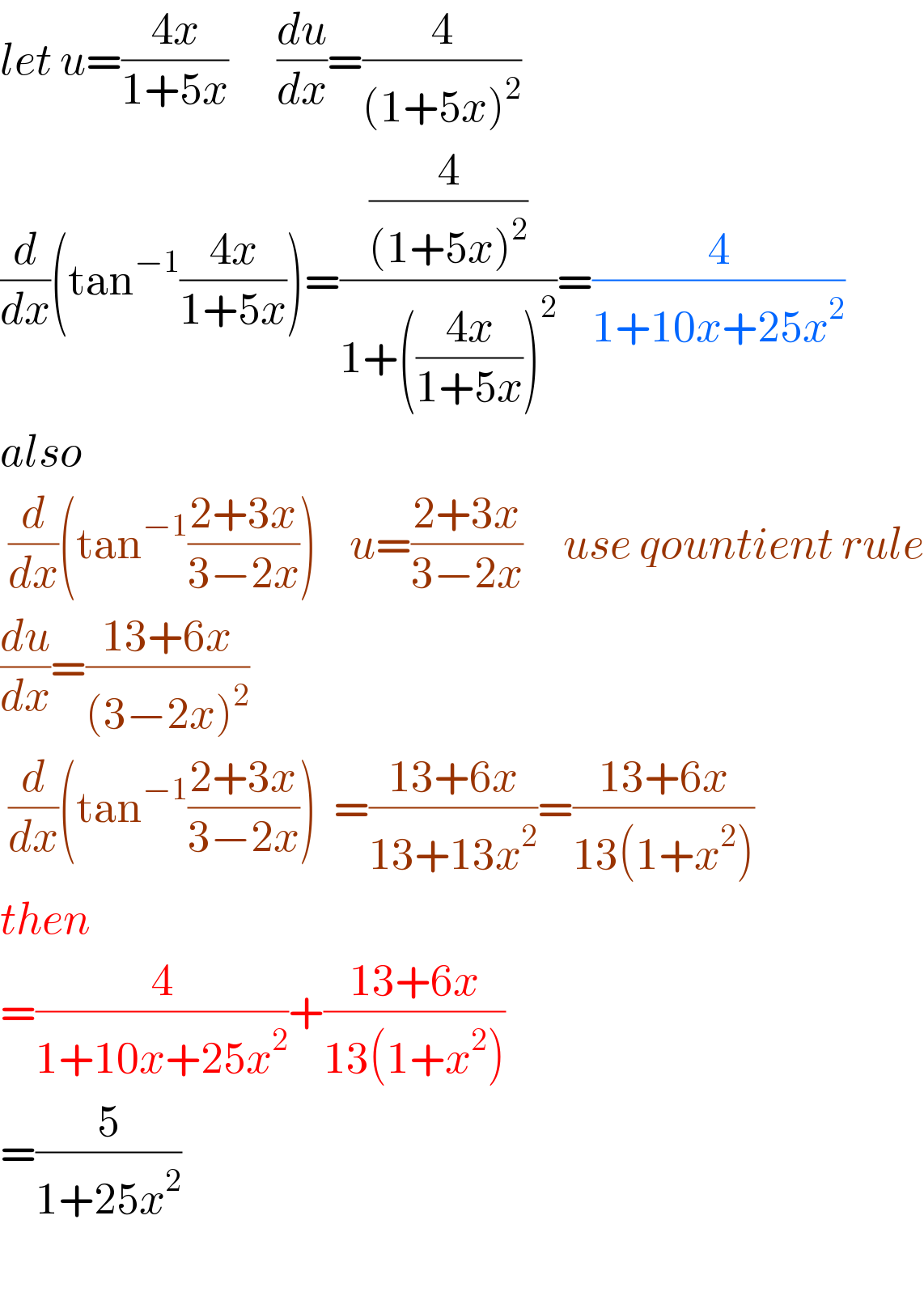
$${let}\:{u}=\frac{\mathrm{4}{x}}{\mathrm{1}+\mathrm{5}{x}}\:\:\:\:\:\:\frac{{du}}{{dx}}=\frac{\mathrm{4}}{\left(\mathrm{1}+\mathrm{5}{x}\right)^{\mathrm{2}} } \\ $$$$\frac{{d}}{{dx}}\left(\mathrm{tan}^{−\mathrm{1}} \frac{\mathrm{4}{x}}{\mathrm{1}+\mathrm{5}{x}}\right)=\frac{\frac{\mathrm{4}}{\left(\mathrm{1}+\mathrm{5}{x}\right)^{\mathrm{2}} }}{\mathrm{1}+\left(\frac{\mathrm{4}{x}}{\mathrm{1}+\mathrm{5}{x}}\right)^{\mathrm{2}} }=\frac{\mathrm{4}}{\mathrm{1}+\mathrm{10}{x}+\mathrm{25}{x}^{\mathrm{2}} } \\ $$$${also} \\ $$$$\:\frac{{d}}{{dx}}\left(\mathrm{tan}^{−\mathrm{1}} \frac{\mathrm{2}+\mathrm{3}{x}}{\mathrm{3}−\mathrm{2}{x}}\right)\:\:\:\:{u}=\frac{\mathrm{2}+\mathrm{3}{x}}{\mathrm{3}−\mathrm{2}{x}}\:\:\:\:\:{use}\:{qountient}\:{rule} \\ $$$$\frac{{du}}{{dx}}=\frac{\mathrm{13}+\mathrm{6}{x}}{\left(\mathrm{3}−\mathrm{2}{x}\right)^{\mathrm{2}} }\:\: \\ $$$$\:\frac{{d}}{{dx}}\left(\mathrm{tan}^{−\mathrm{1}} \frac{\mathrm{2}+\mathrm{3}{x}}{\mathrm{3}−\mathrm{2}{x}}\right)\:\:=\frac{\mathrm{13}+\mathrm{6}{x}}{\mathrm{13}+\mathrm{13}{x}^{\mathrm{2}} }=\frac{\mathrm{13}+\mathrm{6}{x}}{\mathrm{13}\left(\mathrm{1}+{x}^{\mathrm{2}} \right)} \\ $$$${then}\: \\ $$$$=\frac{\mathrm{4}}{\mathrm{1}+\mathrm{10}{x}+\mathrm{25}{x}^{\mathrm{2}} }+\frac{\mathrm{13}+\mathrm{6}{x}}{\mathrm{13}\left(\mathrm{1}+{x}^{\mathrm{2}} \right)} \\ $$$$=\frac{\mathrm{5}}{\mathrm{1}+\mathrm{25}{x}^{\mathrm{2}} } \\ $$$$ \\ $$
Answered by A5T last updated on 30/Jun/24
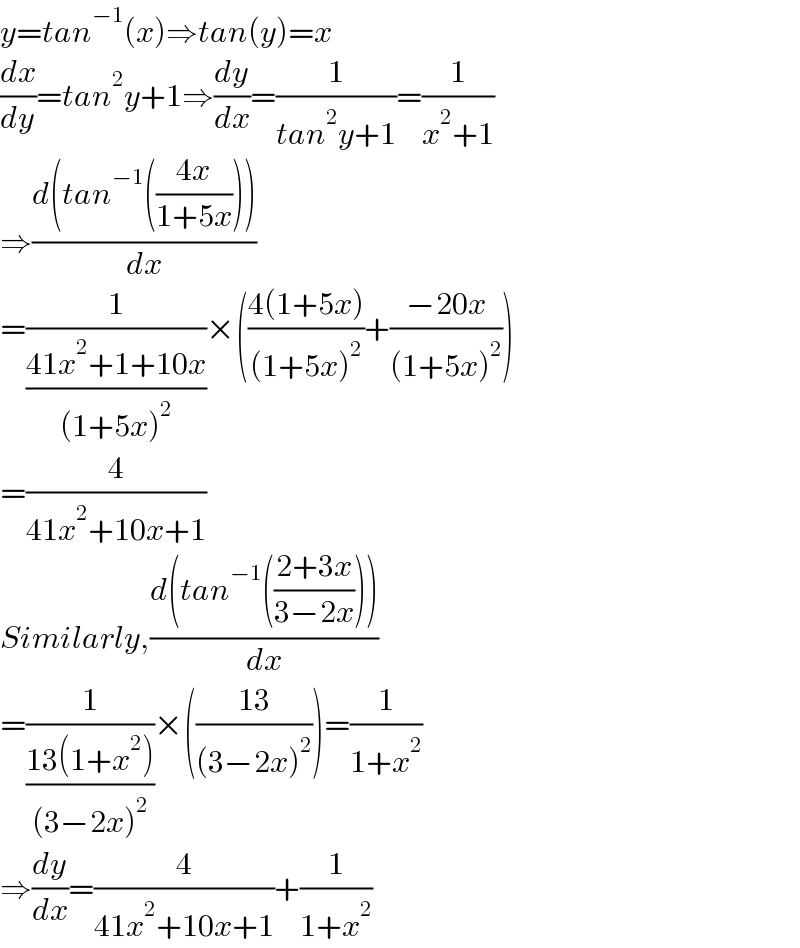
$${y}={tan}^{−\mathrm{1}} \left({x}\right)\Rightarrow{tan}\left({y}\right)={x} \\ $$$$\frac{{dx}}{{dy}}={tan}^{\mathrm{2}} {y}+\mathrm{1}\Rightarrow\frac{{dy}}{{dx}}=\frac{\mathrm{1}}{{tan}^{\mathrm{2}} {y}+\mathrm{1}}=\frac{\mathrm{1}}{{x}^{\mathrm{2}} +\mathrm{1}} \\ $$$$\Rightarrow\frac{{d}\left({tan}^{−\mathrm{1}} \left(\frac{\mathrm{4}{x}}{\mathrm{1}+\mathrm{5}{x}}\right)\right)}{{dx}} \\ $$$$=\frac{\mathrm{1}}{\frac{\mathrm{41}{x}^{\mathrm{2}} +\mathrm{1}+\mathrm{10}{x}}{\left(\mathrm{1}+\mathrm{5}{x}\right)^{\mathrm{2}} }}×\left(\frac{\mathrm{4}\left(\mathrm{1}+\mathrm{5}{x}\right)}{\left(\mathrm{1}+\mathrm{5}{x}\right)^{\mathrm{2}} }+\frac{−\mathrm{20}{x}}{\left(\mathrm{1}+\mathrm{5}{x}\right)^{\mathrm{2}} }\right) \\ $$$$=\frac{\mathrm{4}}{\mathrm{41}{x}^{\mathrm{2}} +\mathrm{10}{x}+\mathrm{1}} \\ $$$${Similarly},\frac{{d}\left({tan}^{−\mathrm{1}} \left(\frac{\mathrm{2}+\mathrm{3}{x}}{\mathrm{3}−\mathrm{2}{x}}\right)\right)}{{dx}} \\ $$$$=\frac{\mathrm{1}}{\frac{\mathrm{13}\left(\mathrm{1}+{x}^{\mathrm{2}} \right)}{\left(\mathrm{3}−\mathrm{2}{x}\right)^{\mathrm{2}} }}×\left(\frac{\mathrm{13}}{\left(\mathrm{3}−\mathrm{2}{x}\right)^{\mathrm{2}} }\right)=\frac{\mathrm{1}}{\mathrm{1}+{x}^{\mathrm{2}} } \\ $$$$\Rightarrow\frac{{dy}}{{dx}}=\frac{\mathrm{4}}{\mathrm{41}{x}^{\mathrm{2}} +\mathrm{10}{x}+\mathrm{1}}+\frac{\mathrm{1}}{\mathrm{1}+{x}^{\mathrm{2}} } \\ $$
Commented by Spillover last updated on 01/Jul/24

$$ \\ $$How did you get that 41?
Commented by A5T last updated on 02/Jul/24
![If y=tan^(−1) (x), then (dy/dx)=(1/(x^2 +1)) y=tan^(−1) [f(x)]⇒(dy/dx)=(1/([f(x)]^2 +1))×f′(x)](Q209110.png)
$${If}\:{y}={tan}^{−\mathrm{1}} \left({x}\right),\:{then}\:\frac{{dy}}{{dx}}=\frac{\mathrm{1}}{{x}^{\mathrm{2}} +\mathrm{1}} \\ $$$${y}={tan}^{−\mathrm{1}} \left[{f}\left({x}\right)\right]\Rightarrow\frac{{dy}}{{dx}}=\frac{\mathrm{1}}{\left[{f}\left({x}\right)\right]^{\mathrm{2}} +\mathrm{1}}×{f}'\left({x}\right) \\ $$
Answered by Spillover last updated on 01/Jul/24
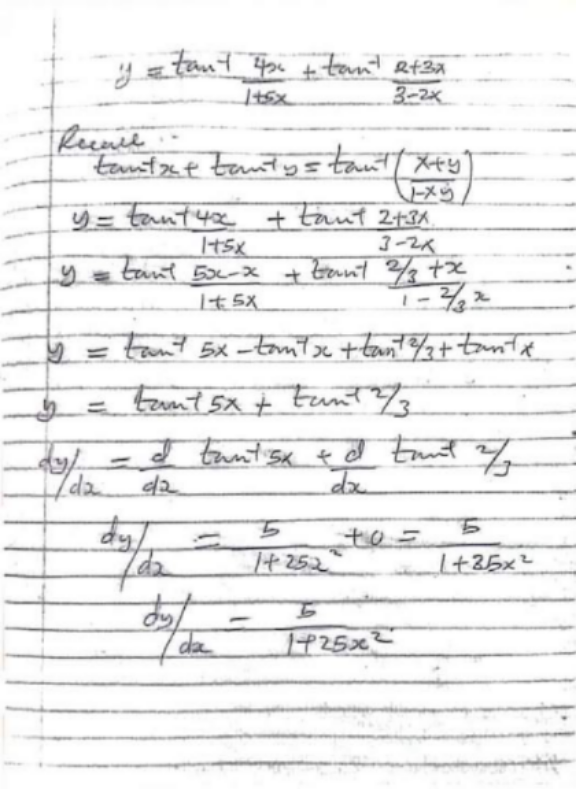
Commented by A5T last updated on 01/Jul/24

$${This}\:{is}\:{not}\:{correct}. \\ $$
Commented by Spillover last updated on 01/Jul/24

$${why}? \\ $$
Commented by Spillover last updated on 01/Jul/24
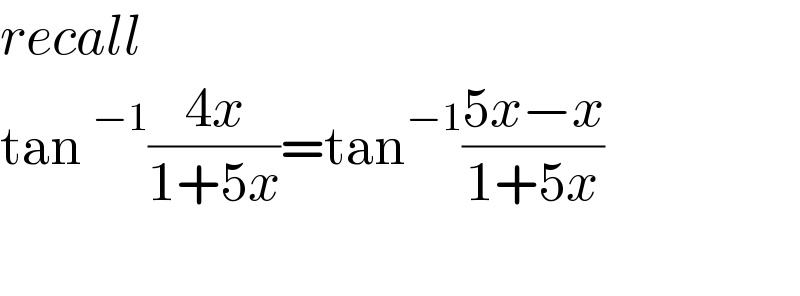
$${recall}\: \\ $$$$\mathrm{tan}\:^{−\mathrm{1}} \frac{\mathrm{4}{x}}{\mathrm{1}+\mathrm{5}{x}}=\mathrm{tan}^{−\mathrm{1}} \frac{\mathrm{5}{x}−{x}}{\mathrm{1}+\mathrm{5}{x}} \\ $$$$ \\ $$
Commented by A5T last updated on 01/Jul/24

$${Have}\:{you}\:{tried}\:{using}\:{multiple}\:{softwares}\:{to} \\ $$$${calulate}\:{this}? \\ $$$${This}\:{seems}\:{dubious}:\: \\ $$$${tan}^{−\mathrm{1}} \frac{\mathrm{5}{x}−{x}}{\mathrm{1}+\mathrm{5}{x}}\:\overset{?} {=}\:{tan}^{−\mathrm{1}} \mathrm{5}{x}−{tan}^{−\mathrm{1}} {x} \\ $$
Commented by A5T last updated on 01/Jul/24
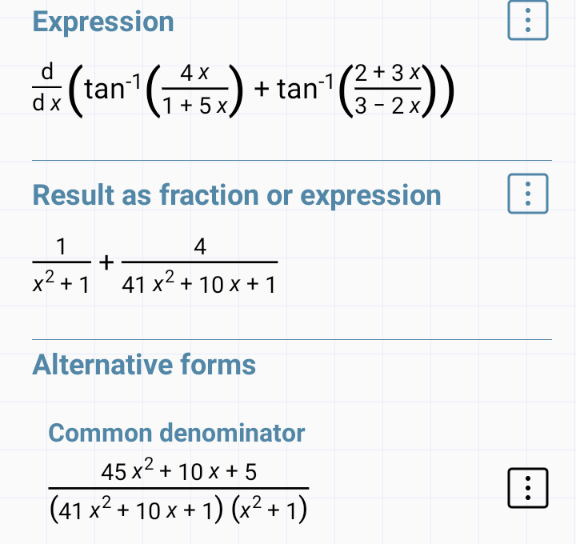
Commented by A5T last updated on 01/Jul/24

Commented by Spillover last updated on 01/Jul/24

Commented by A5T last updated on 01/Jul/24

$${This}\:{would}\:{give}\:: \\ $$$${tan}^{−\mathrm{1}} \mathrm{5}{x}−{tan}^{−\mathrm{1}} {x}={tan}^{−\mathrm{1}} \left(\frac{\mathrm{5}{x}−{x}}{\mathrm{1}+\left(\mathrm{5}{x}\right){x}}\right) \\ $$$$={tan}^{−\mathrm{1}} \left(\frac{\mathrm{4}{x}}{\mathrm{1}+\mathrm{5}{x}^{\mathrm{2}} }\right) \\ $$
Commented by Spillover last updated on 02/Jul/24

$${your}\:{right}\:{thank}\:{you}\:{confirmation} \\ $$$${i}\:{had}\:{forgotten}\:{that}\:{square} \\ $$
Commented by Spillover last updated on 02/Jul/24

$${now}\:{i}\:{understand}\:{you}\:{why}\: \\ $$$${my}\:{way}\:{is}\:{dubious} \\ $$
